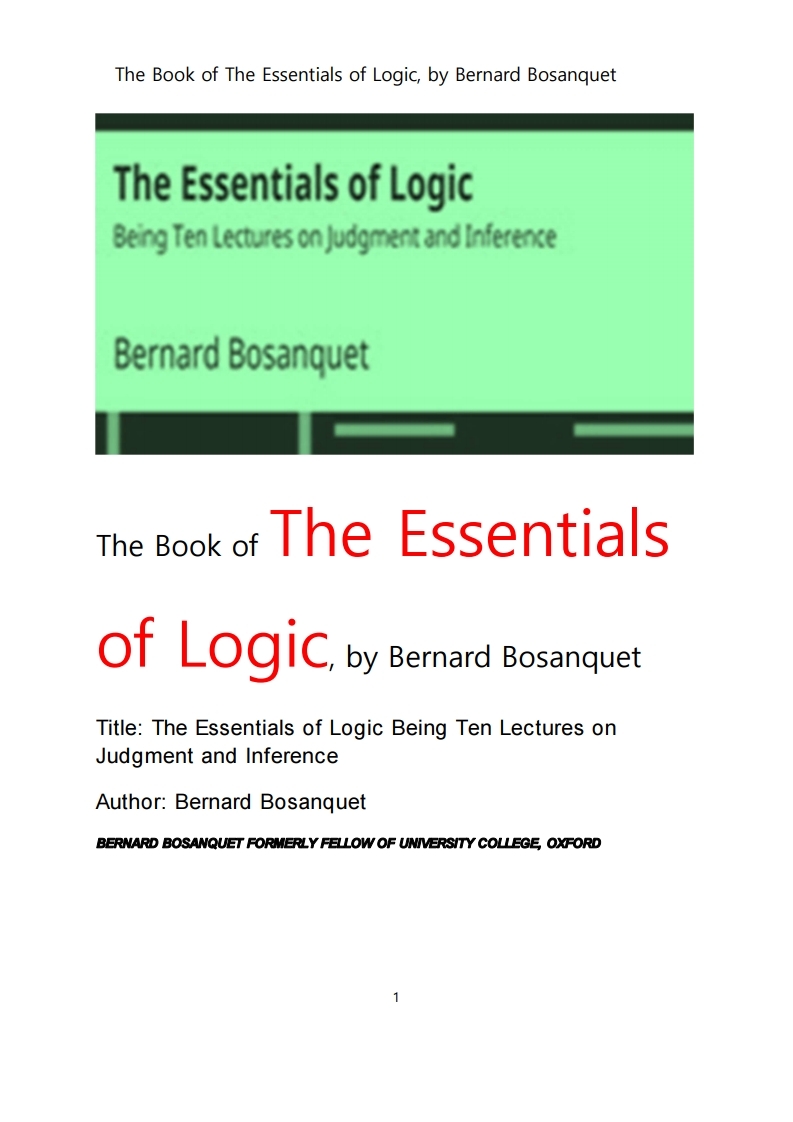CONTENTS
LECTURE I THE PROBLEM OF LOGIC
1. Difficulty of the Science 1
2. The Problem stated 3
3. World as Idea 4
4. “ World” 5
5. The Animal’s World 6
6. The World as “ Objective” 7 i. Common sense 8 ii. Common- sense Theory 8
iii. Philosophic Theory 11
7. Our separate “ Worlds” 14
8. Subjective Idealism 19
LECTURE II JUDGMENT AS THE CONSCIOUSNESS OF A WORLD
1. Defect of Subjective Idealism 21
2. The World as Knowledge 22
3. Knowledge is in the form of Judgment 23 a. Necessary 23 b. Universal 26 c.
Constructive 27
4. The Continuous Affirmation of Waking Consciousness 33
5. Comparison with World as Will 37
6. Distribution of Attention 40
LECTURE III THE RELATION OF LOGIC TO KNOWLEDGE
1. Meaning of “ Form” 42
2. Form of Knowledge dependent on Content 49
3. The Relation of Part and Whole as Form determined by Content 54
4. Nature of Knowledge 58
5. Conclusion 59
LECTURE IV TYPES OF JUDGMENT, AND THE GENERAL CONDITIONS INVOLVED
IN ASSERTION
1. Correspondence between Types of Judgment and Nature of Objects as
Knowledge 61 a. Impersonal Judgment 61 b. Perceptive Judgment 62 c. Proper
Names in Judgment 64 d. Abstract Judgment 65
2. The General Definition of Judgment 66
i. What is implied in claiming Truth 67
ii. By what means the claim is made 69
iii. The kind of Ideas which can claim Truth 74
a. Idea as Psychical Presentation 74
b. Idea as Identical Reference 74
LECTURE V THE PROPOSITION AND THE NAME
1. Judgment translated into Language 80
2. Proposition and Sentence 82
3. Difference between Proposition and Judgment 82
4. “ Parts of Speech” 85
5. Denotation and Connotation 88
6. Have Proper Names Connotation? 91
7. Inverse Ratio of Connotation and Denotation 94
{ ix}
LECTURE VI PARTS OF THE JUDGMENT, AND ITS UNITY
1. Parts of the Judgment 98
2. Copula 99
3. Are Subject and Predicate necessary? 100
4. Two Ideas or Things 101
a. Two Ideas 102
i. Mental Transition 102
ii. Absence of Assertion 103
b. Two Things 104
5. Distinction between Subject and Predicate 107
LECTURE VII THE CATEGORICAL AND THE HYPOTHETICAL JUDGMENTS
1. Some Criticisms on the ordinary scheme of
Judgment 112
a. Why we need a Scheme 112
b. The Common Scheme 113
2. Which Judgments are Categorical? 116
(1) The “ Particular” Judgment 116
a. Natural Meaning 116
b. Limited Meaning 117
(2) “ Singular” Judgment 118
(3) “ Universal” Judgment 119
(4) “ Hypothetical” Judgment 121
(5) “ Disjunctive” Judgment 123
LECTURE VIII NEGATION, AND OPPOSITION OF JUDGMENTS
1. Distinction between Contrary and Contradictory Opposition 126
2. Contrary Negation 128
3. Why use Negation? 130
4. Stage of Significant Negation; Combination of Contrary and Contradictory
132
5. Negative Judgment expressing Fact 134
6. Operation of the Denied Idea 135
{ x}
LECTURE IX INFERENCE AND THE SYLLOGISTIC FORMS
1. Inference in General 137
2. Conditions of the Possibility of Inference 139
3. System the ultimate condition of Inference 140
4. Immediate Inference 141
5. Number of Instances 142
6. Figures of Syllogism, illustrating Progress from Guess- work to Demonstration
146
LECTURE X INDUCTION, DEDUCTION, AND CAUSATION
1. Induction 151 a. By simple Enumeration 151 b. Enumeration always has a
Ground 152 c. Perfect Induction 152 d. System 153 e. Analogy as Step towards
System 155 f. Negative Instance 158 g. Classification and Generalisation 159 h.
Hypothesis 161
2. Deduction 162 a. Subsumption 163 b. Construction 163
3. Causation 164
4. The Postulate of Knowledge 165
5. Conclusion 166
도서소개
저자소개
목차소개





